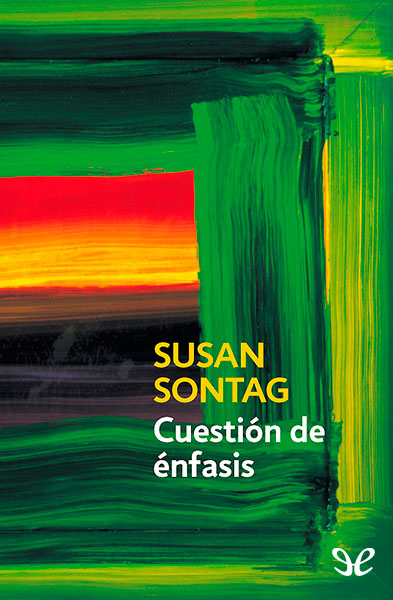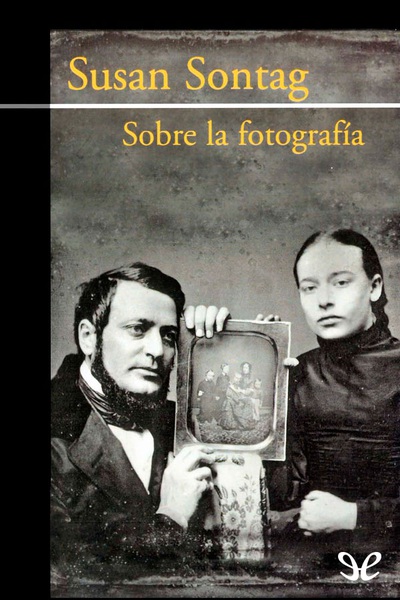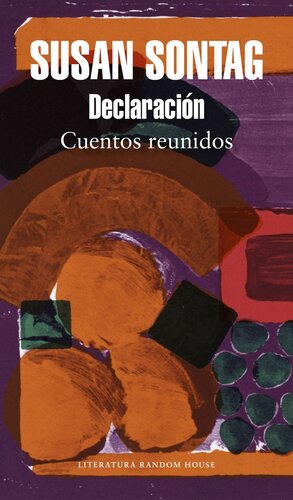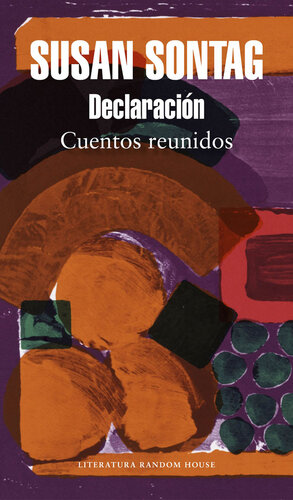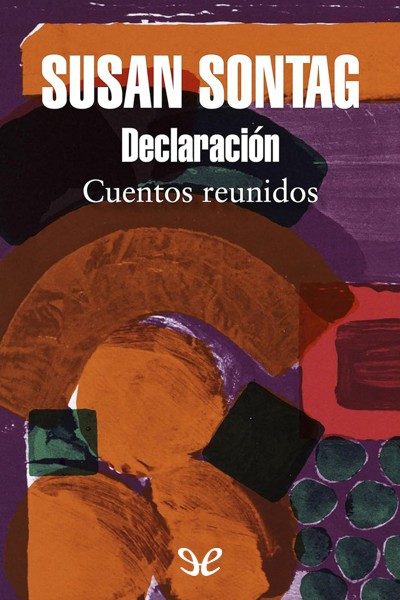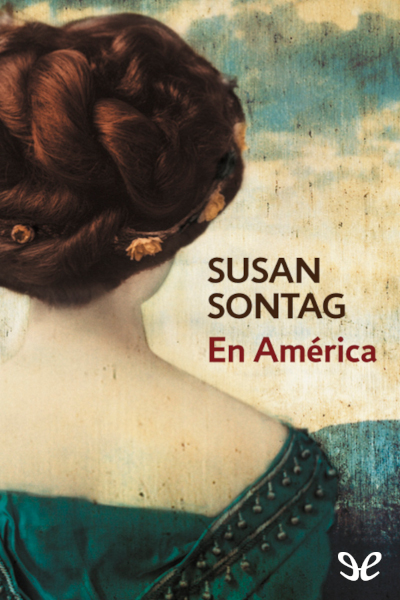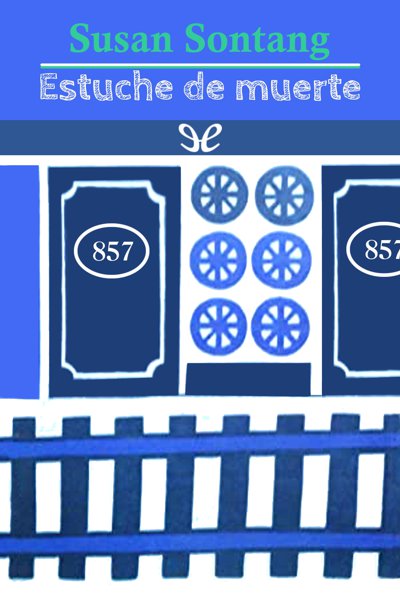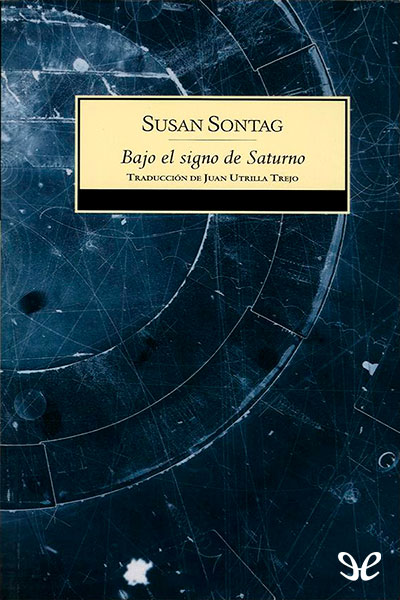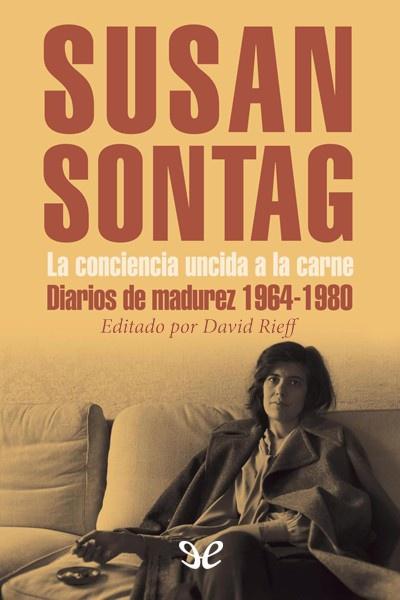oleebook.com
En America de Susan Sontag
de Susan Sontag - GĂ©nero: Ficcion
Sinopsis
Susan, Sontag Year: 2009
Descargar
Descargar En America ePub GratisLibros Recomendados - Relacionados
Comentarios de lectores del libro En America
Le pongo 9.5 a esta obra, poniendo claro que nada es perfecto y si se encontrase algĂșn fallo o error en esta obra, ''lo pase de largo''.''En AmĂ©rica'', tiene un toque de todo, un poco de comedia, infidelidad, momentos crudos, entre otras cosas, que me encantaron de este libro.
Autor del comentario: LUIS BLACK
=================================
Autor del comentario: LUIS BLACK
=================================
Novela valiosa tanto por el interés universal de la historia que narra como por el tratamiento exquisito de la prosa que utiliza la autora. La escena inicial, una descripción de una reunión posterior a un estreno de teatro, resulta deslumbrante. Si al finalizar, no terminas enamorado de la protagonista, es que por tus venas no circula la sangre.
Autor del comentario: NANDOFERR
=================================
Autor del comentario: NANDOFERR
=================================
El argumento de la novela se inspira, segĂșn la autora, en la emigraciĂłn a Estados Unidos en 1876, de Helena Modrzejewska, la actriz polaca mĂĄs cĂ©lebre de la Ă©poca. No me ha entusiasmado. Me atrajo la atenciĂłn la idea del intento de creaciĂłn de una comunidad utĂłpica en AmĂ©rica, al estilo de los famosos falansterios de Fourier, pero en realidad esto apenas es un pequeño parĂ©ntesis fallido en la vida de la protagonista y todo estĂĄ centrado en sus vivencias como actriz y algunos de sus amores y desamores, en el mundo del teatro en general y en algunas de las diferencias entre el Viejo y el Nuevo mundo. En algunos momentos, me ha resultado incluso aburrida y un pelĂn confusa: si no estĂĄs muy atento, a veces, no sabes muy bien cuĂĄl es el personaje que estĂĄ hablando, hasta despuĂ©s de haberte adentrado un poco en su "monĂłlogo" no te sitĂșas.
Autor del comentario: JOSEP5
=================================
Autor del comentario: JOSEP5
=================================
Reseñas Varias sobre este libro
In America was an amazing historical fiction novel by Susan Sontag that was so original in its format that it was hard to put down. This book won the National Book Award in 2000. It embraced America in all of its promise and its rawness as it struggled towards modernity in the late nineteenth century in such an engaging way. In 1876 one of Poland's greatest actresses, Maryna Zalezowska led a group of fellow emigres from Poland to the United States bound for California to a vast farmland and vineyard south of Anaheim in a communal form of living. She was accompanied by her young son and husband who was fleeing his aristocratic family in Poland. Among the emigres were an artist and his wife as well as a young writer hopelessly in love with Maryna. In one way or another most of the party embraced the openness and freedom of this new country as they tried to adapt. And no one tried harder than Maryna but after five years she realized that she missed the stage and studied rigorously to learn perfect English and lose her Eastern European accent. Becoming known as Marina Zalenska, she was embraced by America as she played in theaters and opera houses across the country to packed houses.
This was a woman's search for self-transformation with a lot of emphasis on the theater and our great playwrights such as Shakespeare. Also evident in the unfolding pages was the theme of love and the many myriad forms it may take as we all struggle with our various relationships. This was a book that only Susan Sontag could write.
The writing was luscious with some of my favorite quotes:
"You have to float your ideals a little off the ground, to keep them from being profaned. And cut loose the misfortunes and insults, too, lest they take root and strangle your soul."
"In Poland she had represented the aspirations of a nation. Here she could only represent art, or culture, which many feared as something frivolous or snobbish or morally unhinging. Bogdan pointed out with a smile that Americans seemed to need perennial reassurance that art was not just art but served a higher moral or wholesomely civic purpose."art california historical-fiction ...more36 s Eric578 47
Let me be perfectly clearÂI am a huge fan of Susan Sontag's criticism. "Against Interpretation and Other Essays", "On Photography", and "Regarding the Pain of Others" are books I go back to repeatedly for their ahead-of-their-time provocative points of view. After finishing "In America," I feel it's the critical side of Sontag that makes her fiction suffer. The writing is accomplished and refined, and, formally, the constantly shifting points of view rendered through various writing forms such as correspondence letters and real-time theatrical performance proves to be a clever device to push the story along.
But how has this tireless champion of the avant-garde produced a novel that feels so old and musty, as if it was from the 19th century, but without the strong emotional and moral conflict that informed the best literature of the time by such authors as Tolstoy, Dostoevsky, James, Balzac, etc.? Chapter Zero, with its unnamed mysterious observer/narrator that sneaks into a dinner party, showed promise and piqued my curiosity, but then the novel devolved by having the main charactersÂwho are rather staid, clichĂ©d and uninterestingÂtake over the storytelling reins. Maybe Sontag intended this to be more of a commentary on the social class issues and bohemian hypocrisies of the time, but I just had no emotional connection to any of these people. The book is well-constructed but has no soulÂnot surprising, I think, when its written by one of our most celebrated academic thinkers.
I also can't help but think that this novel, constructed around supposed historical fact, is some sort of sublimated biographical exploration for Sontag. Every character embodies some facet of her life and personality. Maryna, the star artiste who flees her first marriage for fame and fortune on the stage; Ryzard, the aspiring writer; Bogdan, the dutiful husband wresting with his homosexual tendencies and secret affairs; even the portrait photographer that comes to their Anaheim commune to shoot the group conjures a very Sontag- discussion of the photographic medium (not to mention could be tagged as Annie Leibovitz-). But what could have been an interesting exploration of the emotions that drive these characters (and hence Sontag) is too remote, as if the scholar/critic side of Sontag cautioned her fiction writing doppelganger not to reveal too much. So while I appreciate the craft of this novel immensely, I am disappointed that it leaves me so unaffected in the end.fiction27 s Dan1,198 52
I had never read Susan Sontag before but ÂIn America is historical fiction, with the heavy emphasis on fiction, done right.
The drama in this book was underplayed so itÂs not an Âentertaining read in the conventional sense. There are probably three unique points that I took from reading this book. First Sontag focuses on a Polish stage princess, Helena Modjeska known as Maryna in the book, who is of serious renown and wealth and who immigrates to California with her gang of industrious Bohemians to start a new life off the land. So she chooses someone to fictionalize who already has a rich story but is unknown to the vast majority of us.
Secondly her writing style is so enlightening. I learned a great deal about living in late 19th century California. It is evident that she did a great deal of local research.
The last point, which is probably obvious to those who have read the authorÂs other works, is that SontagÂs writing showcases a very strong voice but is not overwrought. The central character, Maryna, exhibits a great deal of strength and influence in an otherwise male dominated 19th century world. The scenes around the romances and affairs are beautifully done.
Five stars. This book is both subtle and muted in its emotional content so it might not be everyoneÂs cup of tea. It won the National Book Award for Fiction in 2000.5-star-general-fiction 5-star-overall national-book-award-fiction31 s Kuszma2,439 205
A legtöbb ĂĄltalam ismert törtĂ©nelmi regĂ©ny ĂrĂłja diszkrĂ©t jelensĂ©g, elbĂșjik a szöveg mögött, Ă©s ĂĄtadja a szĂnt a szerepl?knek  feltĂ©telezem, ezzel is az illĂșziĂłt akarja el?segĂteni, hogy amit lĂĄtunk, nem fikciĂł, hanem a mĂșlt egy darabja. Közben persze az olvasĂł tudja, hogy err?l szĂł sincs, de azĂ©rt hĂĄlĂĄs a gesztusĂ©rt, amit hajlamos szerĂ©nysĂ©gkĂ©nt Ă©s/vagy udvariassĂĄgkĂ©nt Ă©rtĂ©kelni. No most Sontag ezzel szemben azzal nyit, hogy rögtön el?tĂ©rbe tolja magĂĄt, bepofĂĄtlankodik szerepl?i vilĂĄgĂĄba, leĂŒl közĂ©jĂŒk a kanapĂ©ra, azt se tartom kizĂĄrtnak, hogy beleiszik a poharukba. NyilvĂĄn cĂ©lja van ezzel. Ez a masszĂvra Ărt el?hang egyfajta belĂ©p?kapu a regĂ©nyhez, ami mĂ©g azel?tt vilĂĄgossĂĄ teszi a szerz? mĂłdszereit, indokait Ă©s stĂlusĂĄt, hogy tĂșl sok id?t eltöltenĂ©nk a szövegben  egyfajta el?zĂ©kenysĂ©g: Âilyen vagyok, erre szĂĄmĂts, ha nem tetszik, mĂ©g most keress magadnak mĂĄs olvasnivalĂłtÂ.
MiutĂĄn ezzel Sontag megvan, elereszti a gyepl?t, Ă©s a s?r? textĂșrĂĄjĂș bevezet? utĂĄn egy szell?sebb (azaz cselekmĂ©nyes), klasszikusabb törtĂ©nelmi regĂ©nyt kapunk, ahol a szerz? ĂŒdvösen hĂĄttĂ©rben marad, Ă©s ĂĄtengedi a szĂłt f?h?sĂ©nek, MarynĂĄnak, aki a XIX. szĂĄzad harmadik harmadĂĄban otthagyja sokak szenvedett hazĂĄjĂĄt, LengyelorszĂĄgot, hogy AmerikĂĄban prĂłbĂĄljon szerencsĂ©t. No most törtĂ©nelmi regĂ©nyb?l is sokfĂ©le van  az egyik tĂpus konkrĂ©t törtĂ©nelmi esemĂ©nyeket vagy figurĂĄkat akar ĂĄbrĂĄzolni. De nem ez. Sontagot  bĂĄr felbukkannak a regĂ©nyben valĂłs szemĂ©lyek, illetve azok alteregĂłi - inkĂĄbb bizonyos törtĂ©nelmi jelensĂ©gek mibenlĂ©te Ă©rdekli, mĂ©gpedig konkrĂ©tan az Âamerikai ĂgĂ©retÂ, ami milliĂłkat sarkallt arra, hogy otthagyvĂĄn a biztosat, egy ismeretlen földön prĂłbĂĄljanak meg boldogulni. Ez tehĂĄt egy emigrĂĄnsregĂ©ny, amelyben a hĂres lengyel szĂnĂ©szn? szakĂt addigi betonbiztos egzisztenciĂĄjĂĄval (a hĂres lengyel szĂnĂ©szn?sĂ©ggel), Ă©s megkĂsĂ©rli Ășjra felĂ©pĂteni magĂĄt az ĂłceĂĄn tĂșloldalĂĄn. Ami nyilvĂĄn nem megy minden nehĂ©zsĂ©g nĂ©lkĂŒl, de mivel Maryna er?s szemĂ©lyisĂ©g, megoldja. Ez tehĂĄt egy siker kibrusztolĂĄsĂĄnak krĂłnikĂĄja, felĂŒletesen szemlĂ©lve himnusz az Amerikai Ălomhoz  azonban sokkal inkĂĄbb elmĂ©lkedĂ©s a lehet?sĂ©gek termĂ©szetĂ©r?l. ArrĂłl, hogy a felfelĂ© vezet? ösvĂ©ny gyakran sz?k: meglehet, nem egyedĂŒl indulunk el rajta, de egy id? utĂĄn nem fĂ©r el mellettĂŒnk mĂĄs. Persze arra a ÂmĂĄsikÂ-ra is vĂĄr a lehet?sĂ©gek egy ösvĂ©nye  de az egy mĂĄsik, tĂĄvoli csĂșcsra vezet.
(A nagy Edwin Booth, Amerika tĂĄn legnagyobb Shakespeare-szĂnĂ©sze, itt Ă©pp Hamlet jelmezĂ©ben. Ăs nem mellesleg: a regĂ©ny egyik fontos mellĂ©kszerepl?je. Ironikus, hogy hiĂĄba volt zseniĂĄlis m?vĂ©sz, a Booth nĂ©v f?leg bĂĄtyja, John Wilkes rĂ©vĂ©n ismert, aki kĂ©pes volt lel?ni Lincoln elnököt. ĂnreklĂĄmnak elĂ©g meredek.)
Ăs persze ez egy szĂnĂ©sz (avagy m?vĂ©sz-) regĂ©ny is. Nem is tudom, nekem gyengĂ©im a m?vĂ©szregĂ©nyek. TalĂĄn mert mĂłdot adnak a szerz?nek, hogy kett?s ĂĄlarc mögĂ© bĂșjjon: eljĂĄtsszon valakit, aki Ă©ppen eljĂĄtszik valakit. Sontag pedig elĂ©ggĂ© intellektuĂĄlis ĂrĂł ahhoz, hogy az ebb?l fakadĂł lehet?sĂ©gekkel elszĂłrakozzon. Nem fĂ©l a szabĂĄlytalansĂĄgtĂłl, ha kell, elbeszĂ©l?t vĂĄlt, de közben meg?rzi a szöveg ĂĄltalĂĄnos koherenciĂĄjĂĄt. Ăgyes, elegĂĄns regĂ©ny ez, vĂ©geredmĂ©nyben. Ăs amit kĂŒlön a javĂĄra Ărok: jĂłl is olvashatĂł.16 s William2787 3,379
I want to re-read this novel. ItÂs gorgeous.20-ce candidate-to-reread fiction ...more16 s Albert428 42
I have known of Susan Sontag for a long time, but it was really just name recognition. In America was my first experience of her writing and for some reason I didn't have high expectations. The novel is based on the life of Helena Modrzejewska, PolandÂs most famous actress, who at the height of her stardom travels to America with her husband, her son and close friends with the intention of establishing a farming commune; she has no plans for continuing her acting career. In the novel Susan Sontag gives Helena the name of Maryna Zalewska. Maryna eventually decides to continue her acting career, but in America, which means she must perform Shakespeare and other highly regarded plays in English.
Events take place in the last quarter of the 19th century. SontagÂs prose is wonderful; it is elegant, which fits the time period, but not in a way that makes it feel old or dry or dated. Her writing flows, her characters are complex, and her settings are rich in detail. Her description of California and the American West was very visual, and I enjoyed learning about the world of acting and theaters. Structurally, Sontag used a mix of methods, including some stream of consciousness sections and diary elements. The method used seemed to fit the content of the story at that point, making me feel that the author had made the right choice while also putting a lot of effort into varying the style so significantly.
With all these positives I wanted to rate this novel higher, but the plot was rather slow, and it took me quite a while to finish. Also, the writing style could get tedious when the author used lists of elements to provide details. The plot did pick up in the last third. This novel won the National Book Award in 2000.
award-national-book-award award-winners-read reviewed13 s Meredith33
Walking in Mud
I have always wanted to read this book so when I saw it at a school fair I was happy to buy it. On the cover it says it won the National Book Award of 2000 and awards mean a good read. The plot is great - a famous Polish actress decides to emigrate to America with her family and friends and start a community in southern California. The story follows their decision to move to America and the eventual failure of their community and the reinvention of self - a homage to the American dream where you can be anything in America.
I wanted to this book, its full of great detail, moments of brilliance but I couldn't. I hated the writing style. It was walking across mudflats at low tide, you sink to your thighs in the mud and each footstep is an effort but you press on thinking all the time how great it will feel to get to the other side and surely it will get easier at some point. When you finally get to the other side you are covered in mud and too exhausted to be excited about having conquered the mud flats. You just look back thinking why did I bother
www.meredithbrocklebank.com10 s Ron Charles1,078 49.3k
Forget the old boys club: The most engaging historical fiction is being written by women. What's worse, they have the audacity to make it fun.
In Ahab's Wife, Sena Jeter Naslund dared to revise Melville's classic "Moby Dick." Anita Shreve re-created a tense custody battle at the turn of the 20th century in Fortune's Rocks. And Tracy Chevalier painted a stirring portrait of a maid in Johannes Vermeer's house.
These recent books share the same strengths: All of them are carefully researched, lavishly detailed, and expertly plotted. But they also share the same weakness: Despite their historical accuracy, they can't resist the temptation to project modern sensibilities backward onto their feminist heroines. Ironically, the result is to render 200 years of feminist activism essentially irrelevant. Who needs equal access to education? Chevalier's maid helps Vermeer improve his compositions. Equality before the law? Please. Shreve's young mother gets what's hers despite the legal bias against her. Una, Nasland's pre-Civil War berwoman, could edit Ms. Magazine.
Sontag doesn't make this mistake in her rich new novel, inspired by the life of Polish actress Helena Modrzejewska. When Sontag's Maryna reacts against the constraints of her time, she does so in ways that seem historically accurate. This is no NOW posterwoman; Maryna is a character riddled with contradictions, carving out the kind of power available to her, making the necessary compromises and hating them at the same time.
The novel opens with a daring, almost mystical chapter in which Sontag imagines herself conceiving of her characters at a lavish dinner in Russian-occupied Poland in 1875. It's watching a projectionist trying to bring the film into focus. This kind of self-referential, post-modern trick could be annoying, but Sontag is a brilliant writer who doesn't gauge her intelligence by how confused she can make her audience.
As the sun of her circle of admirers, Maryna is at the zenith of her power in Polish theater, but she yearns for a kind of simple authenticity. "She had loved being an actress because the theater seemed to her nothing less than the truth," Sontag writes. "Acting in a play, one of the great plays, you became better than you really were."
Perhaps it's not surprising, then, that Maryna is drawn to an even more elaborate stage of self-improvement: She convinces her husband and their friends to take a luxurious trip half- way around the world to begin a utopian community in California.
Of course, Maryna is doomed to discover that simplicity is a complex quality to acquire. Communal living works fine unless people are involved. The faux community they buy in Anaheim promises "the purifying simplicities of rustic life as lived by the privileged," but the laws of economics play havoc with their vineyard's success.
Clinging to the people she pushes away, Maryna and her friends can't escape the multiple ironies of their situation. "A queen who has abdicated will always be a queen to those who knew her on the throne," Sontag notes. Her devoted husband is tormented by his desire for others. Ryszard, a brilliant writer, is so desperately in love with her that he can't compose anything worthwhile. Their friends Julian and Wanda find their marriage growing more hateful in this bucolic paradise. "Doesn't it seem very American," Ryszard sighs, "that America has its America, its better destination where everyone dreams of going?"
When the community falters, as they all suspected it would, Maryna hopes to reincarnate her former theatrical glory. But she discovers painfully that the costs and rewards of being a great European actress are not the same as being an American celebrity. The result is a fascinating exploration of what's real in a culture that preaches authenticity but worships artificiality.
Sontag is so comfortable spinning these big ideas through the details of her novel that they never seem heavy or intrusive. "In America" we discover the country as the curtain rises on the modern age. After so many moving stories from Irish immigrants, the perspective of aristocratic Poles is unusual, but the plot they encounter belongs to us all.
http://www.csmonitor.com/2000/0309/p1...historical-fiction9 s JanetAuthor 29 books88.7k
A novel about the nineteeth century commune of the great Polish actress Helena Modjeska-- in the era of Bernhardt. It was located near Anaheim California. What an outrageous boatload of bohemians! The commune predated the progressive era's burgeoning of California cults and communes by thirty years. Susan Sontag only wrote two novels, both of them historical, and her sense of character, her ability to bring to life such a wacky crew of intelligentsia utopians, is to be treasured. That Sontag was a Los Angeles native is a fact that often overlooked, but it comes out in her love of this early bohemia. A terrific novel deserving of a new readership. california cults-and-communes9 s Danesda215 254
Aunque buscaba leer era ensayos de esta autora encontré este libro y debo decir que me termine sorprendiendo para bien.
La utopĂa de la vida rural, la independencia de una mujer, la mirada de la sociedad.
una historia sobre lucha y aceptaciĂłn
las mujeres somos lo que somos.
video reseña en:
https://www.instagram.com/p/CLmzhVgAkVi/8 s Sarah873
Well, that was a whole lot of words. About 400 pages where pretty much nothing of interest happened, internally or externally to any of the characters. Was this a story about a marriage? Not really. Story about an immigrant family? No, not quite. Story about America in 1876? No, not exactly. It just seemed a ramble. The first chapter is Sontag imagining herself being a fly on the wall at a party given by this family/friend group. They are based on real people, though she changes their names, presumably creates most of their actions. But I can't figure out why she bothered. Lots of words about the differences in theatre in Poland/Europe (its ART!) and America (its celebrity and $$). But we sure didn't need 400 pages to make that point. Marena, the actress and main character is likable enough, but exceedingly dull. Perhaps it would have been more interesting if her transfer to the US stage was not so successful and quick. Sontag is usually making some sort of political point, and she starts down a whole lot of paths, but I could see no conclusion to any of them. donated7 s Irene1,744 100
This is neither a plot-driven nor a character-driven novel. Despite the decades that the story spans, little seems to happen, or what does happen never conveys any real plot tension. The characters never change or develop beyond the incremental alterations of age and experience. I suppose I would have to describe this as a novel of ideas, a chance for the highly regarded essayist to discuss her thoughts on the nature of theatrical performance, the essential differences between the European and American identity, attitudes toward marriage, family, success, and more with a different audience or through an alternative venue. Based on the life of an actual 19th century Polish actress, this story follows a young theatrical star who emigrates from Poland to California to set up a utopian commune with her intellectual friends. When the commune fails after a year, she returns to her career and achieves equal acclaim on this side of the Atlantic. Maybe I am just not smart enough to appreciate this award-winning novel, but I found it tedious, self-important and quite underwhelming. 7 s Banafsheh175 158
?? ????? ?????? ?? ???? ???????? ????? ???? ???.
??? ????? ???? ??????? ??? ?? ?? ???? ???????? ? ?????? ???? ??? ?????? ?????? ??? ???? ??? ?? ??? ??? ?????.
?????? ?? ??????? ??? ?????????? ?? ????? ?????? ??? ???? ???????? ??????? ? ????? ?? ???? ???????. ????? ??? ?? ?? ????? ?? ????? ?????? ?? ?????.
????? ???? ?? ?????? ?????? ? ?????? ??? ?????? ??? ???? ?????? ?? ?????? ?? ?????? ???????. ???? ??? ??? ?? !! ?????? ????? ?? ?????? ?????? ???.
?????? ?? ???? ?? ?? ??? ??????? ? ????? ?? ????? ?? ?????? ????? ????. ??? ?????? ?????? ???? ???? ???? ?? ???? ??? ? ????? ???? ?????? ????? ???.
???? ?? ?? ?????? ??? ????. ????????? ????? ?? ???????. ?? ??????? ? ???????? ?? ?? ???? ?????.
??? ???? ?????? ???? ????? ????? ????? ? ????? ??? ???? (?? ?????? ? ????????? ????? ?????).7 s Chris Holder20 1 follower
I came for the reputation, stayed for the form and history, stayed til the end for the attention to detail and plot & character development, and was glad to leave when the experiment had run its course.
I am charmed by the peculiar metafiction in this book, but I think it works against itself. Chapter Zero conjures a fictional dinner party that the invisible narrator haunts, observing Polish intellectuals who are based on real historical figures. The titular character, Maryna Zalezowska, derives from the 19th century Shakespearean diva Helena Modrzejewska. The narrator sets out to learn whether "theirs would be a story that would speak to me," and thus to the reader. Fine: I love fiction about a historical problem. However, I made the mistake of reading Sontag's thoughts on the book beforehand. "I made her into a marvelous person. The real Modjeska [Modrzejewska's stage name] was a horrible racist" (found here). I couldn't escape that contradiction: if you're scrubbing these characters of their flaws, how can you expect their story to speak to you?
Also, her approach to citing sources is lacking. The foreword pays homage to a few works, but she does not mention her practice of lifting phrases, descriptions, and a couple whole passages from other works and articles. Sontag described this act as scholarly in-joking, and she distinguished between writers and sources (bullshit). Regardless of her reasons, if she benefited from others' works, why not include a bibliography so others can, too?read-20176 s Emilia MullerAuthor 5 books82
In English - http://bombitaluivladmusatescuenglish...
Ăn limba romĂąn? - http://bombitaluivladmusatescu.blogsp...6 s Whitney695 56
If you're Susan Sontag, this probably counts as an adventure novel. We follow famous Polish actress Maryna Zalenska through the 1870s in America.
Omniscient point of view is all over the place. Maryna, her husband, son, inept maid, and a group of close friends buy a farm in Annaheim California and try to live well and simply there. No one finds happiness and the work is too hard, so she tries out for a part in a local theater and becomes famous all over again, here in America.
She tours constantly and her fame grows. Eventually she and her supporting players and assistants are given their own train car to live and sleep in as they go between cities and venues.
The story could be simple and dull. But it is given lots of texture as the author brings us readers to crash a party at the beginning, and then she borrows some private journals of some of the characters, and at the end we see a drunken soliloquy delivered by none other than Edwin Booth, yes, the surviving actor brother of the notorious Booth who killed Lincoln.
The events are fictionalized. History doesn't support any of the happenings and the central actress doesn't really exist. But she does seem believable.
However, the most prominent character is the author, herself, Susan Sontag. She was a famous essayist in the 1960s. She wrote the article Notes on Camp, which defined a cultural entertainment phenomenon. She took a "you'll-know-it-when-you-see-it" concept and made it so complicated in theory and definition, that to this day I still have no idea what to say about "Camp."
And for some reason when I checked out this book, I had the misconception that she did some time as a humor writer, but most ly I was misinformed. I THINK I remember reading a very funny essay by a woman who spent a day with her friend and her friend's children. But maybe the author was Susan Orlean? Erica Jong? Dorothy Parker? I just don't know!
The author who was probably not Susan Sontag made a note to her readers something in the mood of: "I have no idea why children's hands are ALWAYS sticky! I assume it's because they don't smoke enough."
Does anyone know who DID write that?5 s Ourania Topa142 35
H Susan Sontag ??????... ?????? ????? ??? ???????????? ?????????, ???????????? ???? ??? ???? ??? ????? ???? ????????? ????????? ??' ??? ?? ???? ??? ???????? ???, ????? ?????? ?????? ??? ?? ????????? ??? ???? (???? ???????????, ? ??????? ???? ????????, ? ????? ?? ???????? ?. ?.). ??????? ??? ?? ??? ?? ????????????? ???, ?? ??? ?????? ?? ??? ????????? - ??? ?? ??? ???????? - ????????????? ??? ????????? ??? ?? ???????? ??????????? ????? ??? ??? ???????? ????????, ???? ???????? ???????? ???????? ???????????: "? ??????? ??? ?????????? (1992), ??? ????????????? ???????? ??? ???????? ?????? ??? ??? ?????? ???????? ??? ???????????? ??? ?????? ??? 18?? ?????, ??? ?? ???? ?? ? ????? š"???????" (1999), ?????????? ?? ?? ?????? ??????? ??? ???.
?? ???????: ??????????? ??? 1876 ???? ??? ????? ??? ??????? ??????? ??? ???????? ??? ?????? ???????? ??? ???????? ???, ? ???????? ????????, ??????????, ???? ??? ?? ??????? ??? ?? ????? ??? ???????? ?????? ??? ??? ???? ??? ?? ???????????? ??? ??? ????? ??? ?????????????? ??? ??????? ??? ??? ???????????? ??????? ????????????, ?? ??????????? ?? ??????????? ?????? ???? ??????????, ???? ???????? ??? ?????? ???????????? ?? ??????? ??? ???????? ????????? ???? ?? ??? ??????????? ?????? ??? ??? ??? ????? ?????? ????? ??? ??? ??????????. ?? ??? ????? ?? ?????? ????????? ????? ??? ??????????? ?? ?????????? ??? ??????, ???' ????? ??? ??????????, ????? ????????? ??? ?? ??? ?????????, ???????????? ???? ??? ?????????? ??? ??????? (???????? ?????????, ????????? ??????, ?????? ??? ?????????) ??? ?????? ??????? ?? ???????? ????? ?? ??????? ??? ?? ?????????? ?? ????? ??????? ??????? ???. ? ???????? ??? ?????: ??? ?????? ??????????? ???? ?????????...
? ?????????? ??? ?? ?? ???? ??????? ???????? ???? ??? ??????, ???? ??? ??? ?????? ? ????????? - ???? ??? ?????? ??? - ????????? ??????????, ???????????? ????? ?? ??? ??? ???????? ????????? ??????????? ???????? Helena Modjeska, ??? ?? ?????? ??? ?????????? ?? ???????????? ??? ??????? ??? ??? ??????? ??? ??? ?? ??????????? ?? ??????????? ?????? ??? ????? ??? ?? ?????????? ?????? ??? ?????????????? ??????????, ????? ??? ??????? ??? ?? ?????? STAR ??? ???????????? ????????? ??????, ?????????? ?????? ??? ??????????????? ??? ???????? ???? ??? ?? ?????? ????? ???????? (??? ?????? ??? ???????????). ???? ?????? ????, ?????? ??????? ???? ??????? ?? ???? ??? ????????????? Sontag ?? ????????? ??????? ?? ????? ???????????? ??? ?????????? ??????????, ?? ???? ??? ???????? ??? ??? ????? ???? ????????? ??????????? ????????, ??? ??????? ??????????? ??? ??? ????? ??? ?????? ??? ??????? ?????????? ?? ??????????? ??????, ??? ?????????? ?? ????? ???? ??? ?? ???????? ?????????, ?? ??????? ??????? ? ????????? ????, ??? ?????? ????. ???????? ? ?????? ?????????? ?? ????????????? ????????? ?????????????? ?? ????? ??????????, ???? ? ??????? Paul Whitman ??? ? Henry James, ???? ??? ? ???? ??? ????? (?????? ???? ?????? ???????????? ?????????????? ??? ????? ????????? ? ??????? ????? ??? Puccini), ??? ????????? ?? ???????????????? ??? ?????? ?? ??? ??????? ???????? ?????????? ??????? Edwin Booth, ?????? ??? ?????? ???????? John Wilkes Booth, ??? ?????? ???? ??????? ?? ? ????????? ??? Abraham Lincoln. ?? ??????? ??? ??? ??? ??????? ??????????? ???????????? ?? ?? ????? ??????????? ? ???????...
??? ?????? ??? ???????? ??????????, ??? ?? ???????? ?? ???? ???????? ???? ???? ??????.
4,5
Autor del comentario:
=================================
